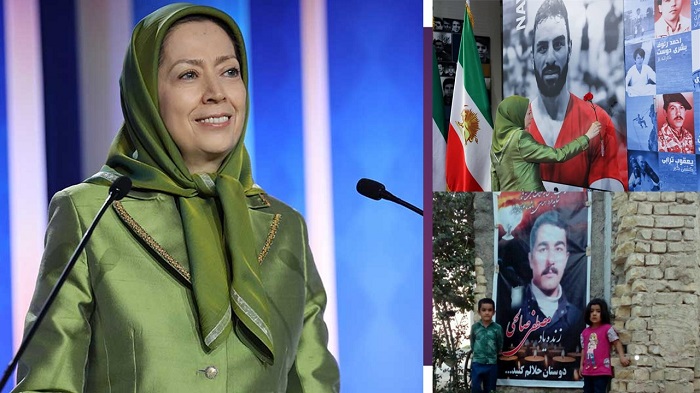

in recent days, sentenced several MEK supporters on the pretext of “waging war against God” in sham trials in Evin Prison thus putting them at risk of execution.
In order to create a climate of terror and to prevent the rise of popular uprisings, and for fear of the reception of the People’s Mojahedin Organization of Iran (PMOI/MEK Iran) by the entire youth, the Iranian regime has launched a wave of executions in Iran.
#MaryamRajavi Call for action to prevent the executions of 7 Sunni political prisoners. The bereaved families of political prisoners Ramin Hossein Panahi, Zanyar, and Loghman Moradi who were innocently executed last year are still seeking justice for them.#MEK #Iran pic.twitter.com/kzd12SHCc7
— MEK Iran (Mujahedin-e Khalq) (@MEK_Iran) September 15, 2020
On September 11, for a third time, Branch 38 of the Mullahs’ Supreme Court upheld the death sentence against seven Sunni political prisoners held in Ward 7 of Gohardasht Prison in Karaj, west of Tehran.
Farhad Salimi, Qassem Absteh, Davood Abdollahi, Ayub Karimi, Anwar Khezri, Khosrow Besharat, and Kamran Sheikha, incarcerated in Urmia, Evin, and Gohardasht prisons for 11 years, had previously been sentenced to death in Branches 41 and 42 of the Supreme Court.
On Thursday, August 6, 2020, Branch 27 of the clerical regime’s Supreme Court upheld the death sentence for political prisoner Haidar Ghorbani from Kamyaran (Kurdistan Province) and referred the case to the Sanandaj prosecution office responsible for carrying out the verdict.
Executions are intended to intimidate people and make them hesitate before standing up against the repressive regime. Particularly considering that the #MEK’s Resistance Units organize so many of the protests in #Iran.#FreeIran2020 #StopExecutionsInIranhttps://t.co/YM0dtQZAmW pic.twitter.com/bkX4viwGmy
— MEK Iran (Mujahedin-e Khalq) (@MEK_Iran) August 12, 2020
At the same time, yesterday, the regime’s Judiciary Chief Ebrahim Raisi reacted to the international condemnation of the criminal execution of Navid Afkari. He said, “Justice-seeking judges who have to answer to God issue verdicts based on law and Sharia. Commotions must not and cannot impact the view of a judge.”
Maryam Rajavi, the President of the National Council of Resistance of Iran (NCRI), called on August 10 for the international community to take immediate action to save the lives of political prisoners and protesters detained in Iran as the ruling regime has begun to issue (and carry out) death sentences in order to suppress uprisings.
The uprisings in November 2019 shook the mullah’s regime to its foundation, and the mullahs’ regime knows that the next uprising could erupt at any time in Iran.
Executions are intended to intimidate Iranian people in particular the youth and make them hesitate before joining the MEK for standing up against the repressive regime. The mullahs regime’s history with the MEK should have taught them the fallacy of that thinking, particularly considering that the MEK’s Resistance Units organize so many of the protests across Iran. however, the oppression of the Iranian opposition, the People’s Mojahedin Organization of Iran (PMOI / MEK Iran) and (NCRI), makes the Iranians people more determined for overthrowing the mullahs’ regime.
the Shaiban Prison of Ahvaz, the prisons of Urmia, Khorramabad and Sanandaj, as well as a number of PMOI/MEK supporters in Evin Prison. #StopExecutionsinIran #Iranhttps://t.co/ytJG4u3rG9 pic.twitter.com/ORqBH9iNfb
— Maryam Rajavi (@Maryam_Rajavi) September 18, 2020
Maryam Rajavi said:
“The religious fascism ruling Iran must be strongly condemned and expelled from the international community for its continued use of torture and arbitrary executions, especially of political prisoners, and its brutal and systematic human rights violations.”
And urged the:
United Nations Security Council, Secretary-General, High Commissioner for Human Rights, and Council of Human Rights, as well as other international organizations to take immediate action to overturn the death sentences. She stressed that an international fact-finding delegation must be sent to Iran’s prisons to meet prisoners, especially political prisoners.







